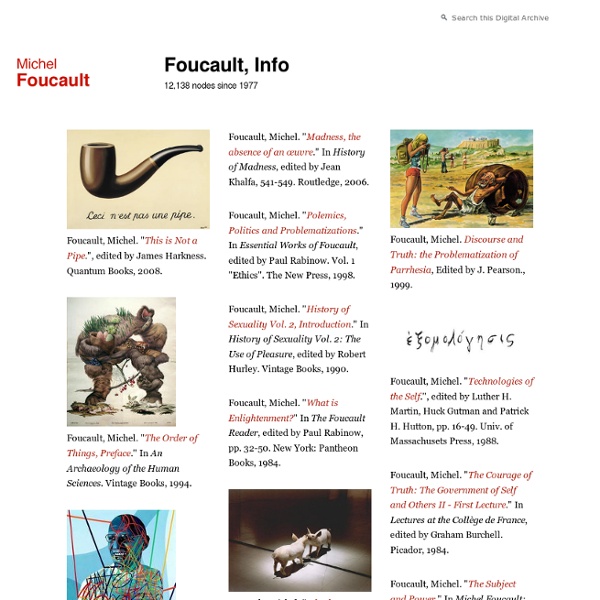



Foucaults Introduction to Kants Anthropology - StumbleUpon - Vimperator Micheal Foucault Translated by Arianna Bove Translator's Note The following text is my translation of Michel Foucault’s Complementary Dissertation on Kant’s Anthropology from a pragmatic point of view, presented as his doctoral research in 1961. The original version in French can be found here. This translation is incomplete and based on my manuscript which at times resulted unclear. This text took shape over a period of twenty five years, and the only stage available to us, transformed in line with Kant’s thought as it brings out new formulations, is the last one. […] Would the archaeology of the text, if it were possible, allow us to see the birth of ‘homo criticus’, whose structure would essentially differ from the man who preceded him? Beilegung [insertion/settlement] Beck regards Beilegung – the imputation of a representation – as the determination of the subject to an object which differs from it and for which it becomes the element of knowledge [connaissance]. World Citizen. 1.
Conference Videos | International Network for Theory of History Day 1, plenary session 1, Frank Ankersmit – “History as the Science of the Individual” Day 1, plenary session 2, Ethan Kleinberg – “The Analog Ceiling: Back to Where We’ve Never Been Part II” Day 2, plenary session 1, Jörn Rüsen – “What is Metahistory? Day 2, plenary session 2, Elias Palti – “The Theoretical Revolution in Political-Intellectual History. Day 3, plenary session 1, François Hartog – “The Future of a Very Old Name?” Day 3, plenary session 2, Gabrielle Spiegel – “The Future of the Past: History, Memory and the Ethical Imperatives of Writing History in the Contemporary World” Day 4, ROUND TABLE discussion with Chris Lorenz, Elisabeth Deeds Ermarth, Wulf Kansteiner, Allan Megill and Ewa Domanska
T H E A T R U M P H I L 0 S O P H I C U M* - StumbleUpon - Vimperator Michel Foucault This review essay originally appeared in Critique 282(1970), pp. 885-908. The translation, by Donald F. I must discuss two books of exceptional merit and importance: Difference and Repetition and The Logic of Sense.(1) Indeed, these books are so outstanding that they are difficult to discuss; this may explain, as well, why so few have undertaken this task. One after another, I should like to explore the many paths that lead to the heart of these challenging tests. Overturn Platonism: what philosophy has not tried? Are all philosophies individual species of the genus "anti-Platonic"? In any event, here is Deleuze. Illusion is certainly the misfortune of metaphysics, but not because metaphysics, by its very nature, is doomed to illusion, but because for too long it has been haunted by illusion and because, in its fear of the simulacrum, it was forced to hunt down the illusory. Occupying the other side of Platonism are the Stoics.
liste » - INA - Jalons Le premier rapport du Comité pour la mémoire de l'esclavage Robert Paxton, historien de la France de Vichy Entretien avec l'historien Jean-Pierre Vernant Histoire et cinéma : Claude Chabrol à propos de L'Oeil de Vichy Pierre Nora présente son ouvrage Les Lieux de mémoire Entretien avec Emmanuel Le Roy Ladurie Entretien avec le médiéviste Georges Duby Cinquante ans de nouvelle histoire La "nouvelle histoire" présentée par Jacques Le Goff Fernand Braudel et les différents temps de l'histoire Aucun document ne correspond à votre recherche ! The Body and Power - StumbleUpon - Vimperator Interview with Michel Foucault Interviewers: editorial collective of Quel Corps?. Dits et ecrits June 1975 You depict in Discipline and Punish a political system where the King's body plays an essential role .... In a society like that of the seventeenth century, the King's body wasn't a metaphor, but a political reality. Its physical presence was necessary for the functioning of the monarchy. And what about the Republic, 'one and indivisible'? That's a formula that was imposed against the Girondins and the idea of an American-style federalism. Is there a fantasy body corresponding to different types of institution? I believe the great fantasy is the idea of a social body constituted by the universality of wilts. The eighteenth century is usually seen under the aspect of liberation. As always with relations of power, one is faced with complex phenomena which don't obey the Hegelian form of the dialectic. I don't agree at all with this talk about 'recuperation'. Certainly.
Home | Contributions to the History of Concepts start [Barfuss oder Lackschuh – Geschichtsinitiativen] AG+T – Arbeitskreis Geschichte+Theorie